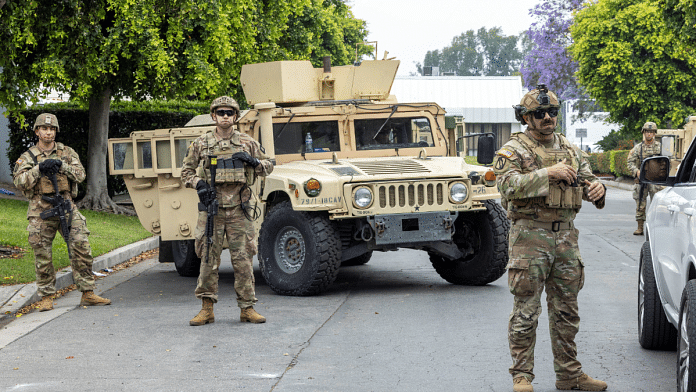California: Troops were used to protect federal property and personnel in California in recent months even though intelligence assessments showed little danger, two military officials testified on Monday at a landmark trial over President Donald Trump’s authority to use soldiers to police American streets.
The three-day non-jury trial before San Francisco-based U.S. District Judge Charles Breyer will determine whether the government violated a 19th-century law that bars the military from civil law enforcement when Trump deployed the troops in June, as the state of California claims in its legal challenge.
Los Angeles experienced days of unrest and protests sparked by mass immigration raids at places where people gather to find work, like Home Depot stores, a garment factory and a warehouse.
Republican president Trump ordered 700 Marines and 4,000 National Guard troops to Los Angeles in June, against the wishes of its Democratic governor Gavin Newsom.
The administration denies that troops were used in civil law enforcement and plans to show that they were protecting federal property and U.S. Immigration and Customs Enforcement (ICE) agents.
The trial kicked off hours after Trump said he was taking the extraordinary step of deploying National Guard troops to fight crime in Washington and suggested he could take similar measures in other U.S. cities.
Much of Monday’s testimony came from U.S. Army Major General Scott Sherman, who until recently commanded the military operations in Los Angeles.
Under questioning from a lawyer for California, he testified about an internal military intelligence assessment that concluded there would be little risk to federal property and personnel during a July 7 immigration enforcement operation at a Los Angeles park.
Sherman said a DHS official criticized him and questioned his loyalty to the country after he denied an initial request for military assistance for the operation. A different request for assistance was later approved by U.S. Defense Secretary Pete Hegseth, Sherman said.
Later during Sherman’s testimony, Judge Breyer asked the general whether the military can deploy troops to incidents even if it has determined there is low risk to federal property or personnel.
“If it is not seen as a situation in which there is a threat, then is it your testimony you can still deploy the military because there may be a threat in carrying out the operation?” Breyer asked.
“That’s correct, Your Honor,” Sherman said.
The Trump administration’s witnesses also described more chaotic situations in which protestors threw Molotov cocktails and damaged federal buildings, justifying the initial use of the military to protect government property.
Many of the troops have been withdrawn from Los Angeles, but California’s Attorney General Rob Bonta said on Monday that 300 National Guard members are still going on immigration raids and restricting civilian movements in the state.
The Trump administration last week extended the activation of troops in the Los Angeles area through November 6, according to a court filing by Newsom.
“The federal government deployed military troops to the streets of Los Angeles for the purposes of political theater and public intimidation,” Bonta said in a statement. “This dangerous move has no precedent in American history.”
California and Newsom, a prominent Democrat, have asked Breyer to prohibit the troops from directly participating in domestic law enforcement activities.
They say the National Guard is accompanying ICE agents on raids and assisting in arrests, in violation of the Posse Comitatus Act of 1878 and other laws that forbid the U.S. military from taking part in civilian law enforcement.
California’s lawsuit ultimately seeks a ruling that would return its National Guard troops to state control and a declaration that Trump’s action was illegal.
The trial before Breyer will have limited impact on Trump’s plan to deploy hundreds of National Guard troops to Washington as part of a crackdown on violent crime in the U.S. capital city, despite statistics showing that violent crime there hit a 30-year low in 2024.
Unlike in California and other states, where the governor typically decides when to activate Guard troops, the president directly controls the National Guard in Washington.
This report is auto-generated from Reuters news service. ThePrint holds no responsibility for its content.
Also Read: US has misread India. New Delhi will hedge, push back, and assert





